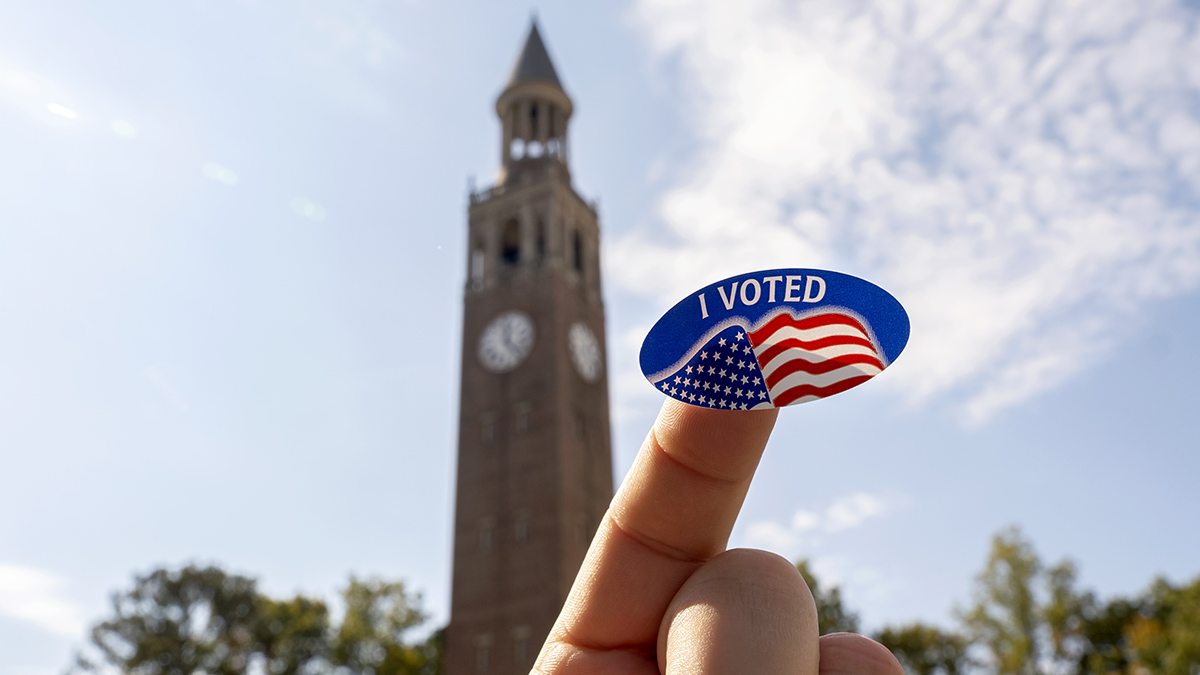Carolina recognized for high student voter turnout in 2020 election
More than 82% of eligible Carolina students voted in 2020, up nearly 25% from the 2016 election.

Voter turnout among Carolina students in the 2020 election was so high that it has earned the University an award and a platinum seal from a national nonpartisan civic engagement group.
Carolina was recognized with the highest voter turnout award among ACC schools during the Nov. 10 Athletic Challenges Awards Ceremony by ALL IN Campus Democracy Challenge. Carolina also earned a platinum seal, which recognizes campuses with a voting rate of between 80% and 89% among eligible student voters.
According to the National Study of Learning, Voting and Engagement out of Tufts University, 82.4% of eligible Carolina students voted in the Nov. 3, 2020, election. That’s up 24.8% from the 2016 election. The same report said that overall, 66% of college students nationwide voted in the 2020 election.
“I am super thrilled. It really was a whole campus effort,” said Lawton Ives ’20, who served as the campus election engagement project fellow in the Office of Student Life and Leadership in student affairs. “The way that student affairs, the academic side and athletics all came together to encourage students to vote is really what drove our voting above and beyond the youth excitement that was happening nationwide.”
This was the first year that ALL IN honored the work of the Athletic Conference Voting Challenges, in which schools competed against their athletics rivals to increase nonpartisan student voter participation and engagement. In the ACC, 15 schools with approximately 325,000 students participated in the DemocrACCy Challenge.
Many student organizations and campus units at Carolina launched initiatives to engage student voters for the 2020 election cycle. The Office of Student Life and Leadership, for example, hosted several activities to provide support to student organizations that promoted voter engagement efforts and created voter education content. Some of these activities included:
- TurboVote, which allowed students to register to vote and receive important voting-related reminders.
- The Civic Engagement Working Group, which is made up of student leaders who coordinated civic engagement efforts and shared resources and best practices for voter engagement. In his role as fellow, Lawton led this group and other civic engagement initiatives.
- The Heel Talks podcast, which each week focused on civic-engagement topics, such as voting in Orange County and protecting access to the ballot.
- Content for social media and campus newsletters that was shared on social media channels and listservs that reach thousands of students.
Carolina Athletics set a goal of 100% voter registration for eligible student-athletes and, among other activities, hosted voter registration drives at athletic training facilities, created a “Heels Vote” campaign on social media and shared voter registration information on GoHeels.com and across email newsletters to students, staff, alumni and fans.
Other offices and groups that organized election-related activities include the Undergraduate Executive Branch of Student Government, the Graduate and Professional Student Federation, the Institute of Politics Civic Engagement Action Coalition, Carolina Center for Public Service, Promoting Democracy faculty group, Carolina Black Caucus, the Office of Diversity and Inclusion, NCPIRG, University Libraries and University Communications.
Promoting Democracy is one of the eight strategic initiatives identified in the University’s strategic plan Carolina Next: Innovations for the Public Good. A key component of the strategic initiative was focused on voter education, registration efforts and reporting on student engagement during the 2020 election cycle.
The ALL IN Campus Democracy Challenge is a national, nonpartisan initiative with a mission is to foster civic culture and institutionalized democratic engagement activities and programs at colleges and universities.




